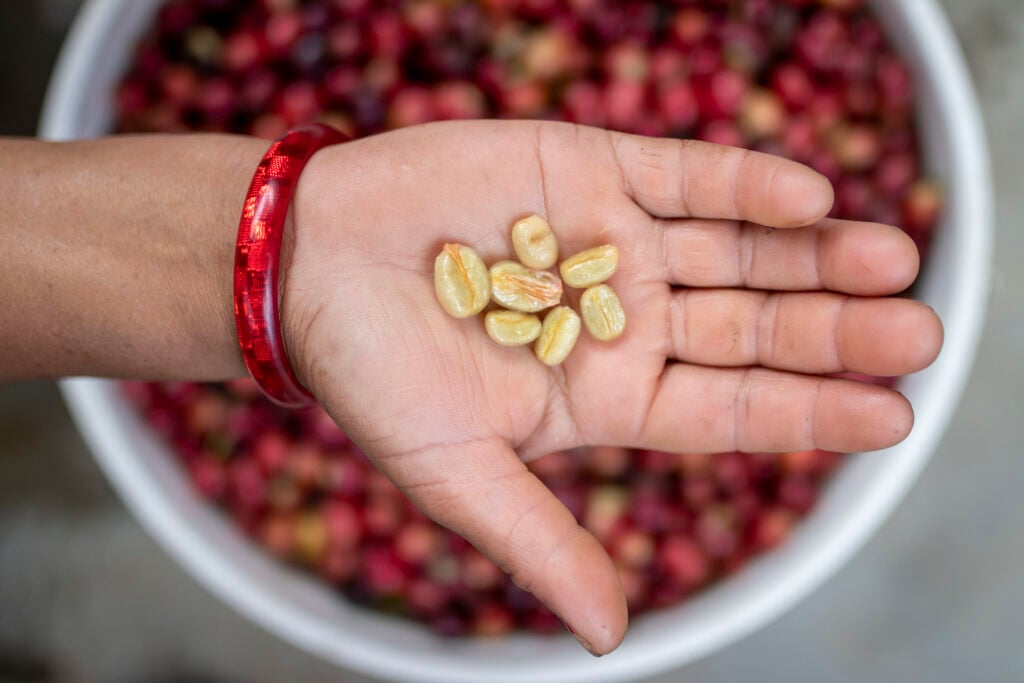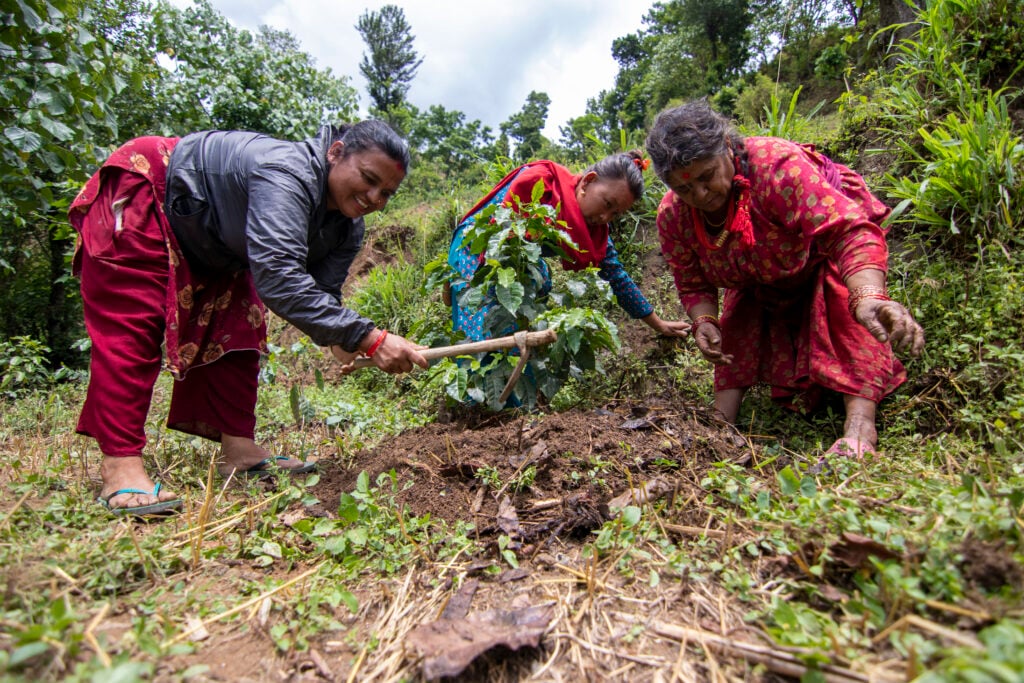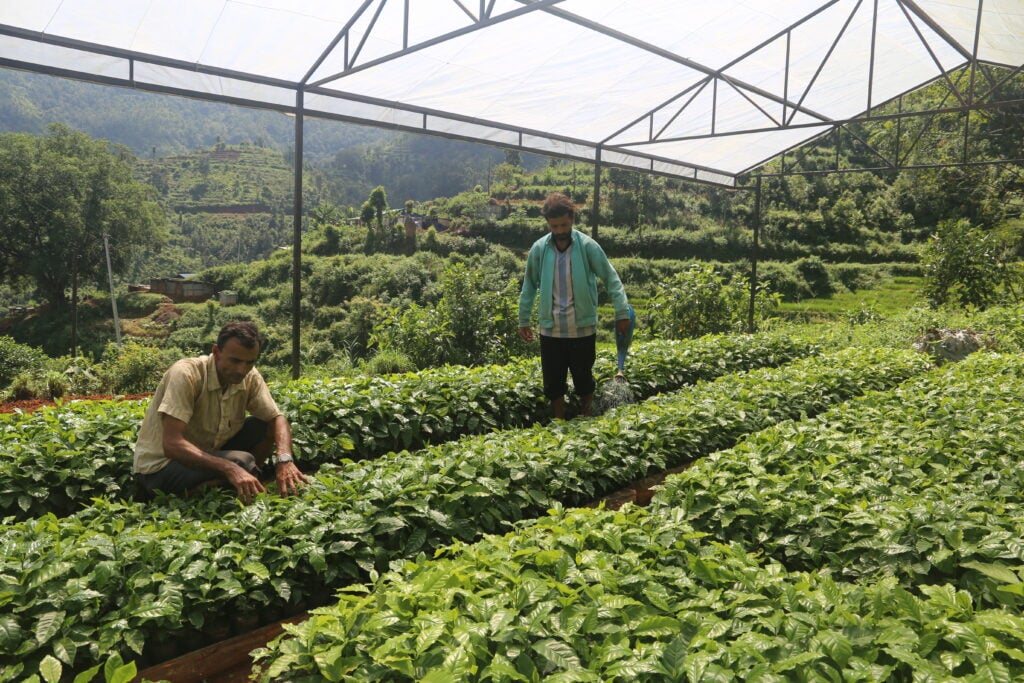For the past two and a half years, Cordaid (formerly ICCO Cooperation) has been contributing to a more inclusive coffee value chain in Nepal. How? By ensuring that people with a disability can play a role of importance. As a coffee farmer, or, at the far end of the chain, as a barista.

Worldwide, coffee connoisseurs know Nepali coffee for its distinct flavour, aroma, and body. It is also a hugely important cash crop in the Himalayan country. Every year, over 30.000 Nepali smallholder farmers produce about 400 tonnes of green Arabica coffee, grown at an altitude between 1000 and 1600 meters. A lot of the farmers use organic and eco-friendly practices.
Watch this short documentary on how we have created an inclusive coffee value chain in Nepal:
Starting a new journey
Sasmita Tamang is one of them. But unlike most, she has a disability. She lost her right arm in an accident. Sasmita used to herd goats. With only her left arm, that was challenging, but she managed. Until recently.
“When I had my firstborn, I could still manage. I would carry him in a basket, graze the herd and collect fodder. After having my second child it became very difficult. Then Sarada taught me how to become a coffee farmer”, she explains.
Sasmita started her new journey with optimism. “Coffee does not need grazing. I just need to tend the saplings once a day, fertilize, water, prune and remove weeds. And the plants produce crops for many years.” And, not unimportantly, good quality coffee, yields good money.
“I believe in creating opportunities for others”
Her coffee journey would not have been successful without the support of Sarada Chaulagain. In the past decade, Sarada established herself as one of the largest primary coffee processors and producers of coffee parchment in her district. Today, Sarada is also one of the resource persons in an FCDO-funded and Cordaid-implemented inclusive coffee project in two Nepali districts, Kavrepalanchok and Sinshupalchok.

Sarada learned the coffee trade the hard way, and now teaches others. “My first coffee harvest, eight years ago, was four kgs. The main issue was finding a buyer”, she recollects.
“Our society is still built for people without disabilities. With a little consideration and effort, we can make it inclusive and fair for all.”
By taking courses in coffee orchard management and integrated pest management, Sarada improved her skills and her business. Today, she teaches others to do the same. “I believe in creating opportunities for others, especially women with disabilities. With the right kind of support, everyone can soar.”
A father, a son, and a coffee nursery
Tika Madhav and Suman Nepal, father and son, are two other participants in the Inclusive Coffee project. After a near-fatal accident at an early age, Suman eventually recovered from the seizures he had started getting. But the intellectual disability caused by the accident remained. He has three children.
His father, Tika Madhav, supports him as much as he can. “The reason I became interested in coffee farming was the potential to yield sustainable income from coffee plants for years”, he says, standing next to the coffee nursery he manages with his son. “It helps to provide a financially secure future for the family.”

As participants in the Inclusive Coffee project, together with 30 other families in Kavrepalanchok with members who have a disability, Tika Madhav and Suman received training, input support, and technical supervision to establish their coffee nursery. Every family has planted hundreds of coffee saplings in their nursery fields.
The Inclusive Coffee project supports 320 farmers, many of whom have a disability like Sasmita and Suman, in starting their own coffee farms.
Cordaid/ICCO’s coffee connection in Nepal
Cordaid’s (formerly ICCO Cooperation’s) coffee connection in Nepal started in 2017, when we began implementing a two-and-half-year EU-funded project in six districts, called the Hamro coffee project. It supported farmers in enhancing the quality and quantity of their coffee cherries and improving their primary facilities, and traders in strengthening domestic and international market linkages. Employing more youth in Nepal’s coffee sector was also one of its aims. As a result, Cordaid/ICCO Cooperation is now a well-established name among stakeholders in the Nepalese coffee sector.
Inclusive coffee is transformative
Based on these learnings, in 2020, Cordaid became one of the implementing partners of the Inclusive Coffee project, which is part of FCDO’s Disability Inclusive Development initiative. Inclusive Coffee has a transformative effect on the Nepalese coffee sector. People with disabilities and their organisations, and coffee value chain actors co-create solutions to make Nepali coffee more inclusive. From inclusion at the production level to primary processing, trade, and export.
“I know my consumers care about social impact, traceability, accountability, and fair business practices.”
“We bring in the technical coffee value chain expertise”, explains Bidyanath Burtel, Cordaid’s Country manager in Nepal, “and the National Federation of the Disabled – Nepal brings the expertise from the disability field.”
Other partners include the Organization of Persons with Disabilities, the National Coffee Academy, and social coffee entrepreneurs in Nepal like Kedar Saptkota and Raj Kumar Banjara.
The intersection of good business and social impact
For these entrepreneurs, coffee means business, but they also care about the social impact of the coffee they produce and sell.
“There is a growing market for Nepali coffee. The consumer base is mostly urban, educated youth. Even though the concept of social entrepreneurship is relatively new to us, I know my consumers care about social impact, traceability, accountability, and fair business practices”, says Kedar Sapkota, a domestic coffee trader and retailer.
Another entrepreneur in the inclusive coffee project, also seeking the intersection of good business and social impact is Raj Kumar Banjara. This ‘coffee educator’ launched barista courses for young people with a hearing impairment. After Banjara’s training, many of the participants found employment at popular cafes in and around Kathmandu.
Making society inclusive and fair for all
“It only shows we need to ensure that people with disabilities have the opportunity to prove themselves”, he says. “Our society is still built for people without disabilities. With a little consideration and effort, we can make it inclusive and fair for all”, Banjara concludes.
Or in the words of Sasmita, whose disability didn’t stop her from redefining her journey: “Coffee farming is for all. And we, people with disabilities, can stake a claim.”
The inclusive coffee project in Kavrepalanchok and Sindhupalchok districts supports 320 coffee farmers (120 of which have a disability), five coffee traders, four processors, and 41 baristas. The baristas have disabilities. The traders and processors employed people with disabilities.
The Inclusive Coffee Value Chain Project is part of the Inclusive Futures Development Initiative. Inclusive Futures is a disability-inclusive development initiative working to ensure all children and adults with a disability have the same likelihood as everyone else to access quality education, health, and work opportunities. Spanning two programmes in seven countries over six years, Inclusive Futures is unprecedented in its scope and scale. Funded by UK aid, it brings together 16 development organisations, the public and private sector, working with and for people with disabilities and the groups that represent them.


